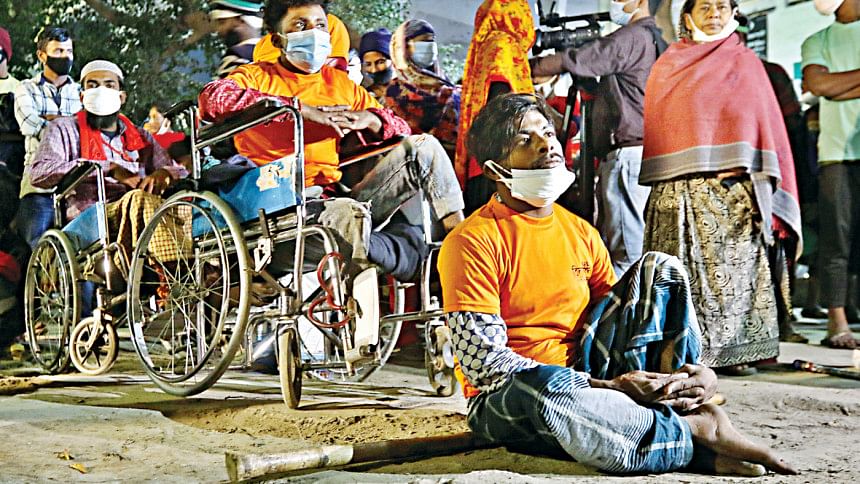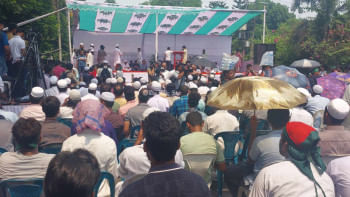Vaccination awaits milestone

Bangladesh is closing in on the milestone of vaccinating 10 crore people with the first Covid-19 dose despite facing many a challenge.
The number of people inoculated with the first dose rose to 9.89 crore as of Saturday. The government is also administering around seven lakh second doses and around 68,500 booster doses along with around three lakh first doses daily.
The first dose has so far been given to 82 percent of the targeted 12 crore people – around 58 percent of total population, according to the Director General of Health and Services (DGHS).
Besides, around 6.5 crore or 53 percent of the targeted population have received second jabs as of yesterday.
"We may need a couple of more days to reach the 10-crore milestone. Despite all odds, we have reached this stage. Obviously, it is a matter of joy for all of us," Dr Shamsul Haque, member secretary of DGHS's National Vaccine Deployment Taskforce, told The Daily Star.
He said, "Now our focus is to fulfil the target of inoculating 70 percent of the population as early as possible. We have enough vaccine supply for that."
The mass inoculation campaign began on February 7 last year.
Meanwhile, the government yesterday started vaccinating Madrasa students and floating people.
As part of the special campaign, on the sidelines of the regulation vaccination drive, 700 students of Jamia Siddiquia Noorani Women's Madrasa in the capital's Mirpur got their first dose, while street dwellers near Kamalapur Railway station were jabbed with Johnson and Johnson's single dose vaccine, according to the DGHS officials.
From November 1 last year, the health directorate started a campaign to vaccinate schoolchildren aged 12 and above.
The government started the mass campaign with Covishield over a week after the trial run on January 27 last year, but suffered a huge setback when the Serum Institute of India suspended the supply of the purchased three crore vaccines, after sending only 70 lakh doses in two consignments following the Indian government's embargo on export in April 2021.
According to a tri-patriate agreement, Serum was supposed to supply the purchased vaccine within six months. Besides, there were commitments of 6.8 crore doses from Covax, a global initiative, by 2021.
Covax's pledge to supply vaccines to low-income countries also suffered a blow as the rich countries secured a majority share of the vaccines produced by global companies for their own population.
Due to dearth of supply, the government was forced to suspend the vaccination campaign from April 26, which was resumed on June 19 on a limited scale with around 11 lakh Sinopharm jabs in hand.
"The suspension of the vaccine campaign was a reflection of incompetency and incapacity of the officials concerned in the government. Despite those, the 10-crore first dose milestone makes us hopeful. We must thank the government for this," Prof Nazrul Islam, member of the National technical Advisory Committee (NTAC) on Covid-19, told The Daily Star yesterday.
After Serum suspended supplies, the government started exploring alternative sources desperately.
By June, it purchased 1.5 crore doses of China's Sinopharm vaccine and then another six crore in August.
The country also got around one crore doses of different brands from Covax in phases.
The government has so far been using Covid-19 vaccines developed by six different companies -- Covishield, China's Sinopharm and Sinovac, Pfizer, Moderna and Johnson & Johnson's.
As supplies and the campaign gained momentum, the government reduced the age bar to 18 years, from 55, by August 20 in phases, in an effort to reopen educational institutions.
By this time, the government also implemented multiple special inoculation drives to bring more people under the vaccine coverage, especially for people living in rural areas.
Out of the regular 1,005 regular vaccination centres, the DGHS expanded the vaccination campaign to union and ward levels. Currently, vaccines are also available in countrywide community clinics.
Meanwhile, there were some complaints of irregularities and sufferings during special drives. At least four people were injured during a scuffle at yesterday's vaccine drive near Kamalapur Railway Station.

 For all latest news, follow The Daily Star's Google News channel.
For all latest news, follow The Daily Star's Google News channel. 



Comments